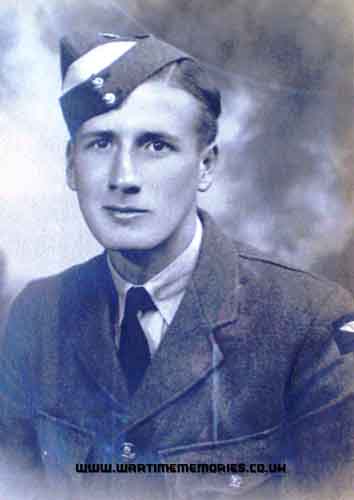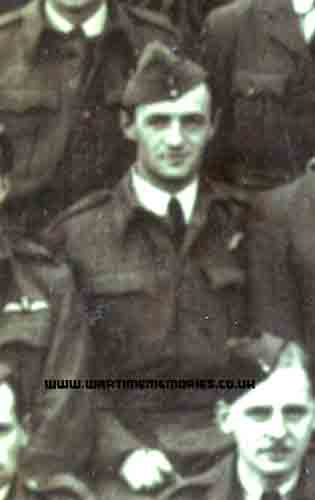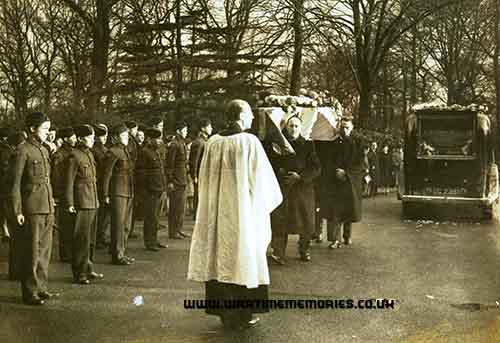W/O William Birdsall James DFM.
Royal Air Force 51 Squadron
from:Leeds
(d.10th Nov 1944)
This is Bill James's story, it is factual drawing on eyewitness accounts.
Dusk on 18th August 1941. At R.A.F. Dishforth in Yorkshire, Squadron Leader John Bouwens D.F.C. is leading a line of Whitley Bombers to the grass runway. The target is the German city of Cologne, an industrial and route centre occupying a key point in the German rail network. Bouwens is an experienced pilot and is leading a force of twelve bombers from 51 Squadron at a point in the war where losses are mounting. This is to be a fateful night for many of the aircrew.
With the distinctive throaty roar of the Merlin engines reverberating across the darkening landscape, Bouwens lifts his aircraft with its load of bombs and incendiaries clear of the ground and climbs away towards the target. A few minutes behind him is Whitley Bomber “Q for Queenie”, at the controls is Sergeant Bill James, a Yorkshireman from Leeds and at 20 already an experienced pilot.
The aircraft crosses the coast still climbing to the cruising level of around 11,000 feet, it is an almost moonless night and they are spared the freezing conditions so often encountered. Bill’s navigator, Pilot Officer Derek Roberts, settles down at his navigation table and checks his chart. There are no fancy electronic aids at this stage of the war, just a map, compass, slide rule and protractor. He will be navigating using time and distance with the wind vector figured in. Over a blacked out continent and little moonlight (which brings it’s own problems anyway) there isn’t much scope for map reading.
Cologne at least is easy to recognise if there is some light, the distinctive bend in the Rhine and the cathedral next to the railway yards. It is these railway yards they are to attack. The bomber drones on through the night, the other aircraft on the raid are invisible, formation flying at night is dangerous at the best of times but without navigation lights it would be suicidal. Each bomber is effectively on it’s own.
William Birdsall James was the only son of a schoolteacher and had attended West Leeds Boys High School, he had also visited Germany with his father shortly before the war. The preparations for war he saw there shocked him and encouraged him to join the R.A.F. By August 1941 at the age of just twenty he was now one of the squadron’s best pilots, greatly trusted by his crew. Over Frankfurt on 22nd July in a violent thunderstorm a “Flak” shell exploded under the bomber’s wing turning the aircraft onto its back. Not something the lumbering Whitley was designed for! Bill managed to right the aircraft and bring it under control but not before losing 8,000 feet. It was by flying like this that he gained the confidence and respect of his crew.
At about 2 AM “Queenie” arrives over the target area and begins the bombing run. The weather is good but this just helps the German gunners, heavy flak bursts around them as searchlights probe the sky. Despite this the aircraft makes it through the storm unscathed and drops it’s load of bombs. At the end of the run Bill turns steeply away from the target to shake off the searchlights and settles onto the new heading given to him by Derek for the return journey.
This return journey is not necessarily the easy bit, aircraft may have unknown damage from flak over the target, there are the usual navigational hazards, fatigue, the possibility of fog over the home airfield and of course night fighters. It was a preferred time for opening thermos flasks though, drinking early in the flight might mean using the aircraft’s primitive toilet facilities!
Derek sits down at his navigating table to open his flask of coffee when the interior of the aircraft suddenly lights up with the intense illumination of a searchlight. They are not out of the woods yet and have encountered an unexpected searchlight battery. As there is no smoke without fire, so it is with searchlights and guns. Cursing loudly Bill throws the aircraft into a series of violent manoeuvres in an attempt to shake off the light. Flak shells burst around them but despite Bill’s best efforts the searchlight remains steadfastly on target. Inevitably the flak closes in as the gunners correct their point of aim and a violent explosion shakes the bomber as it takes a direct hit.
Acrid smoke fills the cabin and the aircraft dives earthwards, Bill with shrapnel wounds in his legs struggles to control it but realising a crash is inevitable he coolly gives the order to bale out. His crew hesitate, reluctant to leave the security of the bomber and somehow believing “Queenie” will get them home as she always does. A curt, authoritative repetition of the order dismisses any such beliefs and they hastened to their parachutes. The tail gunner, Sgt Janus, one of two Canadians in the crew, drops out through his turret but the second pilot, Don Switzer struggles to get the front hatch open. With the aircraft screaming earthwards Derek Roberts assists him and soon Switzer’s lanky frame is through the hatch and plummeting into the darkness. Derek is right behind him, a quick check of his harness and through the hatch. Sgt Lowe, the wireless operator, has more to worry about. His parachute has been shredded by shrapnel and is clearly useless, he resolves therefore to stay in the aircraft.
Bill is now in a dilemma, the bomber was careering earthwards and Lowe can’t possibly fly it. He takes his own parachute and thrusts it at Lowe ordering him to jump. In any aircraft the pilot is in charge and in a situation like this his orders must be followed immediately, at 2000 feet Lowe jumps into the black void of the forward hatch. Bill despite his leg wounds manages to bring the aircraft to earth in pitch darkness, so badly damaged it cannot remain airborne, landing in an unlit field. It is another amazing piece of flying but also his last.
Struggling clear of the wreckage, Bill had the presence of mind to set fire to the aircraft to prevent the enemy from making use of it. He was then taken prisoner by the Luftwaffe, who probably treated him well, as the others were that day, but the future was bleak. He was taken to hospital to be treated for his leg injuries and from there went into the P.O.W. system. Bill James went to Stalag Luft 3, from there he wrote home praising the coolness and discipline of his crew. From reports sent back home by them he was awarded the Distinguished Flying Medal in July 1942, cheers rang out in the camp when the news arrived over their secret radio. Soon afterwards Bill developed tuberculosis, probably aggravated by poor diet and overcrowding in the camp.
He was eventually repatriated via the Red Cross, but died about two weeks later. I have been told he held on to life long enough to return to England as he did not want to die in Germany. Bill was an only child, his parents kept in touch with his crew after the war but must have been heartbroken, as were many.
John Bouwens didn’t make it either, he was killed the following year in the Far East and four out of the twelve bombers that night failed to return. Bill James is now remembered at his old school, I have the gold pocket-watch he would have inherited from his father and been given James as my middle name.



